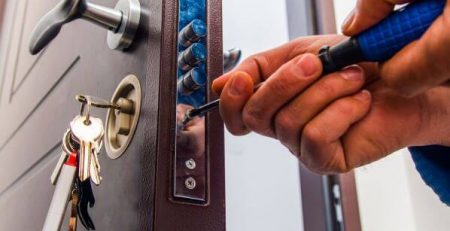What Front Door Should I Have Installed On My Front Door From A Security Perspective
The best front door for security is the one which will stop anyone from forcibly entering your property. Unfortunately the days of leaving your door unlocked are long gone. Your front door is the achilles heel of your home and the point in which between 60% and 70% of burglars gain entry to your property. It then becomes evident that if you want peace of mind the best thing to do is to acquire a secure door for yourself, your home and your family.
In this article we will examine the types of doors fitted to the average British home and what door is the most secure, there costs as well as the locks which are fitted to each door and what else you can do to help increase the security of your door.
Types of Doors
Wooden Doors
The traditional wooden or timber door has fallen out of fashion of late in favour of cheaper UPVC or Composite doors. However timber doors which are solid and at least 44mm thick are stylish and come in a huge variety of designs and colours. Wooden doors tend to be more expensive, less durable and require increased maintenance when compared to their UPVC or Composite counterparts. Wooden doors are typically fitted with a latch and a 5 lever deadlock.
UPVC Doors
UPVC stands for Unplasticised Poly Vinyl Chloride and is a relatively new material which was introduced in the eighties and is used heavily in Europe and North America and has become very popular for the following reasons.
- Costs – UPVC tends to be cheaper when compared to wooden and composite doors, while providing additional benefits.
- Durability – UPVC is resistant to fading, corrosion and rotting.
- Fire Safety – UPVC is fire resistant unlike wooden doors.
- Energy Efficiency – UPVC is known for its insulating properties, both sound and heat.
- High Security – UPVC doors as standard come with a Multi point locking system. This system is usually operated by a euro cylinder and when operated properly is very secure.
The primary issue with UPVC doors is with the quality of the mechanism pre fitted, in addition to the lock fitted when the door is first installed. Older and cheaper doors may be fitted with a sub standard mechanism which means the door will not automatically lock when shut. The door may also be fitted with a sub standard euro cylinder lock leaving your door vulnerable to lock snapping, lock drilling or lock bumping, allowing criminals to gain entry to your property. Unlike wooden doors UPVC doors do not support any other lock except where it has been designed to go. Consequently you will not be able to add any other security measures. However if fitted with a quality door mechanism and a high security euro cylinder lock all your security issues will be addressed. A good quality UPVC door with a high quality mechanism and high security 3 star British standard Euro cylinder is an excellent choice for your front door.
Composite Door
Composite doors were created in response to the flaws of singular material doors such as UPVC and timber. For example UPVC doors are created from just UPVC and the same goes for Timber doors. While Composite doors use a variety of materials each chosen for their individual and specific properties.
Materials used in the construction of composite doors include solid timber, reinforced steel, UPVC and reinforced glass often glued together under high pressure to ensure such materials can withstand brute force attack. If you choose a composite door ensure it meets PAS 24BS. Composite doors come in a wide range of colours and designs and are also an excellent choice for your front door.
Types of Locks
In the UK you will typically see three types of locks fitted to Wooden, UPVC and Composite doors. These are as follows.
- Euro Cylinders –
Used on – Composite Doors & UPVC Doors
Vulnerable to – Lock Snapping, Lock Picking, Lock Bumping, Hooking, Fishing, Door Popping
- Night Latch –
Used on – Wooden Doors
Vulnerable to – Lock Picking, Lock Bumping, Brute Force, Sliding
- Mortice Lock –
Used on – Wooden Doors
Vulnerable to – Lock Picking, Lock Bumping, Brute Force, Sliding
Tactics Used By Criminals
Criminals use a wide and ever growing number of tactics to bypass your doors security. These are just some of the measures criminals use to gain access to your home.
- Lock Picking – Lock picking involves the careful manipulation of the internal components of the lock without using a key. This can be achieved with lock picks which can be brought very easily and cheaply.
- Sliding – Sliding involves using something very thin and flexible to slide in between a door frame and latch in order to remove the tension allowing the burglar to open the door.
- Lock Snapping – Lock snapping is exactly what it sounds like and involves snapping the lock in two. Using simple tools such as hammer and pliers criminals can snap an exposed euro cylinder and gain entry to your property in as little as 10 seconds.
- Fishing – Fishing involves pushing a hook through your letterbox to carefully retrieve any keys left in sight and reach.
- Lock Bumping – Criminals use special made keys called bump keys to bump the pins into place unlocking your door.
- Forces – Criminals will use sheer brute force to kick down your door.
- Hooking – Criminals can insert a hook through your letterbox and with careful precision will turn your door handle from within. This only works on UPVC or Composite doors and can be achieved in as little as 15 seconds.
- Door Popping – Using an air pillow criminals can create a small gap in a UPVC or composite door, then using a spade or chisel to leverage the door and litrialy pop it open.
How To Improve Your Doors Security
We will now examine the simple steps you can take to counter any threat for UPVC, Composite and Wooden doors.
UPVC & Composite Door Security
UPVC and Composite doors are very similar; they both share internal locking mechanisms and the use of a euro cylinder which is why we have grouped them together.
Double Locking – By far the easiest and cheapest way to increase the security of your door. On UPVC and Composite doors this simple involves grabbing your door key and inserting it into your euro cylinder lock, then lifting the handle to engage the mechsiums hooks and bolts then turning the key to lock. By simply double locking your door you
- Dramatically increase the doors resistance to forceful attacks
- Make it impossible for criminals to use the hooking technique
- Make it impossible to pop the door open
Upgrading Your Locks – High quality Euro cylinders are essential for good door security. High Security locks which meet British standard 3621 and come with a 3 star rating are recommended by the Police and Insurance companies alike.
3 Star rated locks are designed to counter any attempt to override them. They do this by;
Stronger Materials & Anti Drills Pins – Using tougher and stronger materials including Molybdenum in addition to anti drill pins and plates this allows the lock to withstand any drilling attempt for a much longer period of time.
Sacrificial Sections – A sacrificial section will be located on the external section of the lock. This section is designed to snap off and sacrifice itself in the event of a lock snapping attempt, leaving the rest of the cylinder safely within the door.
Security Pins, Magnets & Better Design – Innovative designs which can be seen on Ultion, ABS and Banham utilise a range of designs from 12 pins to magnets making it almost impossible for a criminal to either pick or bump the lock.
Simple Door Additions – Simple additions to your UPVC doors such as a door chain, sash jammer and high security handles which help protect the euro cylinder can have a big impact on the security of your front door.
Wooden Doors Security
Double Locking – Double locking your wooden doors can involve two things depending on the quality of the locks you have. If you have a standard night latch you will have to manually engage your latches lock this is usually a button found on the front or side of the latch. The second way and best way to double lock your wooden door is to lock your 5 lever mortice lock. By locking both your mortice lock and your latch you
- Dramatically increase the force resistance of your front door
- Make it impossible for criminals to use the sliding technique
Upgrade Your Locks – As discussed earlier having high quality locks makes a huge difference to UPVC and Composite doors and Wooden doors are no exception. Ensure you have a double locking night latch or an automatic locking night latch, the latter will automatically deadlock when shut making sliding impossible, however the most secure is a double locking night latch which can be double locked with a key from the inside.
You should also ensure you have a high security 5 lever Mortice lock fitted to the door. High security deadlocks are much harder to bypass.
Simple Doors Additions – Simple doors additions such as a peep hole, door chain and letter box cage can make a huge difference. For example a simple letter box cage can make it impossible for a criminal to use a hook to open the door, a peep hole can and door chain allows you to identify anyone at your front door without exposing yourself.
London & Birmingham Bars – Wooden doors can be vulnerable to brute force attacks. One way to enhance your door and door frames force resistance is to have a London and Birmingham bar installed. These are metal bars which fit around the frame of the door and attach to the wall, greatly increasing the doors force resistance.
For more information on home general property security check out the Metropolitan Police website & ITCC Locksmiths Blogs.
So What Door Is Best?
To be honest the type of door doesn’t really matter, UPVC, Wooden or Composite they all provide excellent security if utilized correctly with the correct lock. It all depends on your taste and budget.
Wooden Doors come in a huge variety of designs and colours but tend to be the most expensive and may require higher maintenance compared to UVC and Composite doors.
UPVC Doors tend to be the cheapest and the least aesthetically pleasing and probably the least secure out of the three but not by any margin worth considering.
Composite doors are the strongest and come in a wide range of colours and designs but tend to be more expensive than UPVC.
To summarise all three types of doors can provide excellent security. It primarily depends on how the door is utilised and the security features of the door.
This post was written by Callan Wells-Raynes, a manager at ITCC Locksmiths in London.





